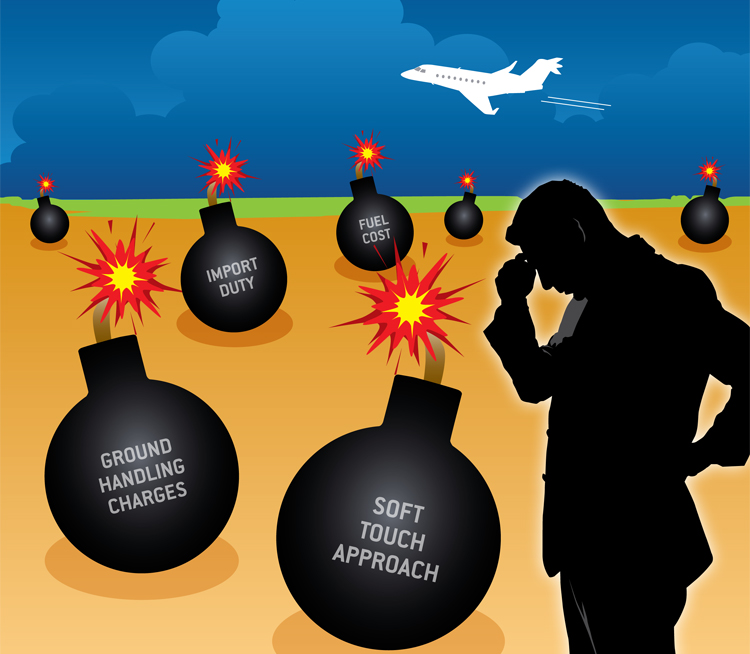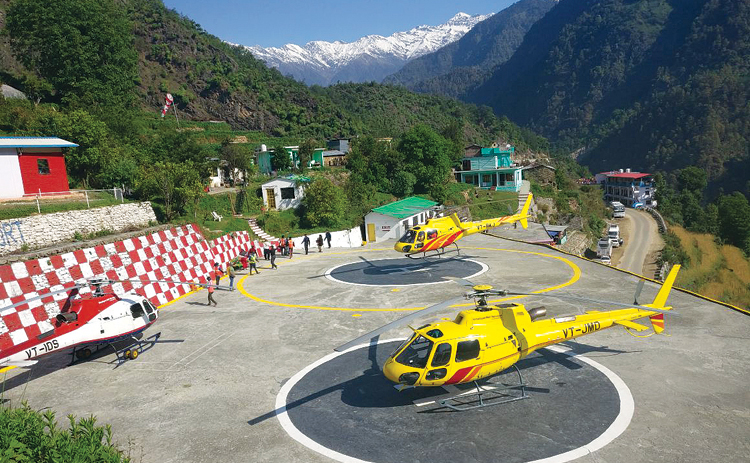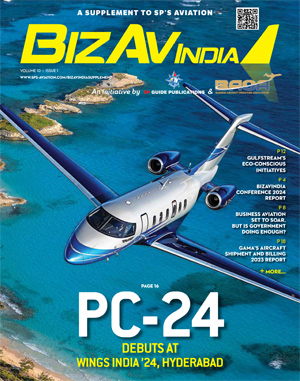EXCLUSIVE
Dire Straits
Reeling under crippling airport costs, India’s Business Aviation Industry gasps for intervention by the aviation regulator AERA. Airport levies need to be determined by Civil Aviation’s economic regulator AERA as aeronautical charges on a Cost-Plus Model if the struggling industry is to survive, reasons Group Captain R.K. Bali (Retd), Managing Director of the Business Aircraft Operators Association (BAOA) in an interview to BizAvIndia’s Vishal Thapar


BizAvIndia (BAI): What is the principal challenge with regard to Ground Handling charges being faced by BA operators?
Group Captain R.K. Bali (RKB): Ground handling charges for non-scheduled operators at airports like IGIA Delhi have been increased by 60 per cent. A 6-seater business aircraft like the B-200 attracts ground handling charges of 29,700 at Delhi. This quantum of charge is unbearable. The average flight of a business aircraft is 1 hour and 15 minutes. The revenue is between 85,000-90,000 per flight hour. Business aircraft operators work on margins of 5 per cent. The huge, arbitrary increase in ground handling charges is an exploitation by airport concessionaires, and threatens to cripple business aircraft operators.
BAI: What solution is BAOA suggesting?
RKB: The BAOA wants ground handling charges rationalised. We want these determined by the Airports Economic Regulatory Authority (AERA) as aeronautical charges under the AERA Act 2009 under the Cost Plus method. At the moment, these are being decided arbitrarily by airport operators as non-aeronautical charges under the Soft Touch approach.
Under the AERA Act, charges for aeronautical services are to be decided by AERA with a Cost Plus approach. The determination of aeronautical services charges by AERA bring the levies down to levels below what they pertained in 2005. Airport operators have invoked a provision of Operations Management and Development Agreement (OMDA), a Cabinet decision of 2005, which states that the minimum charges will never be less than those prevailing in 2005 Plus 10 per cent. But the AERA Act, as a legislation of Parliament, must supersede a Cabinet order, and ground handling charges must accordingly be determined by AERA as an aeronautical service charge rather under the Cost-Plus approach than one to be determined by airport operators through a Soft Touch approach.
BAI: Could this be an issue of a monopolistic excess by the airport operators?
RKB: This is a fit case for the Competition Commission because the airport operators/concessionaires are using monopolistic practices to exploit the situation. But for now, we’re looking at getting this rationalised through AERA as an aeronautical charge determined under the Cost-Plus method.
BAI: What is your immediate expectation from the regulator?
RKB: We have approached AERA for redressal. The first step is for AERA to accept that this is an issue under its jurisdiction. The Soft Touch approach is flawed also because it overlooks the aspect of increase in revenue for airport operators through increased volumes. It is an accepted practice worldwide that facilitation fees should be brought down in view of increasing volume of passengers and traffic, and the benefit passed on to the passenger. The aviation business has to make money through volumes. Otherwise, it’s not sustainable. Volumes cannot be overlooked.
“It is an accepted practice worldwide that facilitation fees should be brought down in view of increasing volume of passengers and traffic, and the benefit passed on to the passenger. The aviation business has to make money through volumes. Otherwise, it’s not sustainable. Volumes cannot be overlooked.”
BAI: How many BA operators have shut down their business in recent years due to lack of business friendly environment?
RKB: These are challenging times for the business. Growth was 26 per cent in 2007. The BAOA had 139 operator-members in 2012. Today, the number is down to 109. Thirty operators have shut down business during this period.
The smaller operators are more vulnerable to changes like the sharp and arbitrary hike in ground handling charges. They need more regulatory protection and support. Seventy per cent of our operators have one or two aircraft only.
BAI: What other supportive steps need to be taken by the Government and the regulator for the sustenance and growth of this service?
RKB: Hanger availability for maintenance is an issue. Scheduled airlines have long-term hanger lease. For us, the hanger requirement is for a short duration, at it comes at very high rates which are determined as a non-aeronautical tariff. The Delhi airport has raised it by three times over the 2012 figure.
We want regularisation of hanger availability as per housing charges decided by AERA as an aeronautical requirement. This is an essential requirement for ensuring airworthiness and safety. Aircraft need to be serviced regularly and maintenance checks carried out as the OEM’s manual.
BAI: Has there been any tax relief from the Government?
RKB: There’s an import duty of 2.5 per cent on aircraft for small non-scheduled commercial operators whereas its zero per cent for big scheduled commercial operators. BAOA wants import duty waived/rationalised to zero per cent for all commercial use – whether by scheduled or non-scheduled operators. We’ve taken this up with the Ministry of Finance through the Economic Advisor to the Ministry of Civil Aviation.
BAI: Has there been any relief this year from high turbine fuel prices?
RKB: The fuel cost component is 35-to-40 per cent of the total cost of operation. There is an issue of double/triple taxation because of the Fuel Throughput charges taken by the airport operator from the oil companies like a royalty. The increase in charges is passed on to the operators. The tax on ATF should go. For this, we want ATF to be brought under the GST regime. At the moment, with ATF under VAT , the Fuel Throughput charges are generating a revenue of 400 crore for the States. Only one state is opposing ATF being brought under the GST regime.

BAI: Is the UDAN-RCS environment supportive of BA? What is the opportunity?
RKB: The flights in Phases 1 and 2 of UDAN were taken up by Air India Alliance, IndiGo and SpiceJet. Phase 3 brought in sea planes. The UDAN case so far has been based on 30-40-seater aircraft. Ours are 6-to-20 seaters.
The 4th phase of UDAN is expected to have a helicopter element for connectivity to remote hill areas. Here, we will have a big role to play. We have over 10 helicopter operators amongst our members. This should be a good utility to the public. There will also be a big scope in providing air service to pilgrims, particularly in hilly areas, for instance Char Dham and Vaishno Devi.
BAI: What steps are being taken to further improve safety standards?
RKB: BAOA IS seeking acceptance by DGCA of two international programmes for higher safety standards. These are the International Standard of BA Operators (ISBAO) and International Standard of BA Handling (ISBAH). If accepted, international experience can be dovetailed here. We can share the standards with our members. By adopting these standards, operators can face and clear any safety inspection or audit.
“Internationally, benefits of scale are being leveraged through Aircraft Management Company and Fractional Ownership Models. We’re trying to see how these models can be adopted in India.”
BAI: Are the BAOA and other industry bodies helping operators buy or lease business jets on better terms?
RKB: There’s huge potential for lease in India, with the requirement of the number of commercial aircraft set to grow to 1,000 in three years. At the moment, there are no Indian players, and all business aircraft are owned. The terms of lease are easier for big operators or corporates, and need to be rationalised for smaller players. We’re working with the Economic Advisor to the Ministry of Civil Aviation for Indian leasing to promote growth of the business aircraft sector in a big way.
BAI: Is the BAOA helping the industry develop viable and sustainable business models? If yes, what are these models?
RKB: Small operators with one of two aircraft will find it difficult to survive. There are huge costs and sub-optimal use of imported aircraft.
Internationally, benefits of scale are being leveraged through Aircraft Management Company and Fractional Ownership Models. We’re trying to see how these models can be adopted in India. Papers have been presented to the Government of India, which is looking at regulatory issues and financial aspects.
Under the Aircraft Management Company model, owners are different from operators. Not saddled with cost of ownership, operators can have large fleets and reap economies of scale. Operators are responsible for the regulator. The owners are responsible for purchase and depreciation. This has to be given a huge push for the Industry to survive. Otherwise, aircraft will be cost centres operators will be saddled with. There are successful examples overseas in B-Jets and Amjet. B-Jets is operating 500 jets in Europe.
Under the Fractional Ownership Concept, there are many owners, and cost of aircraft is shared in terms of proportional use or the number of hours a fractional owner can fly.





